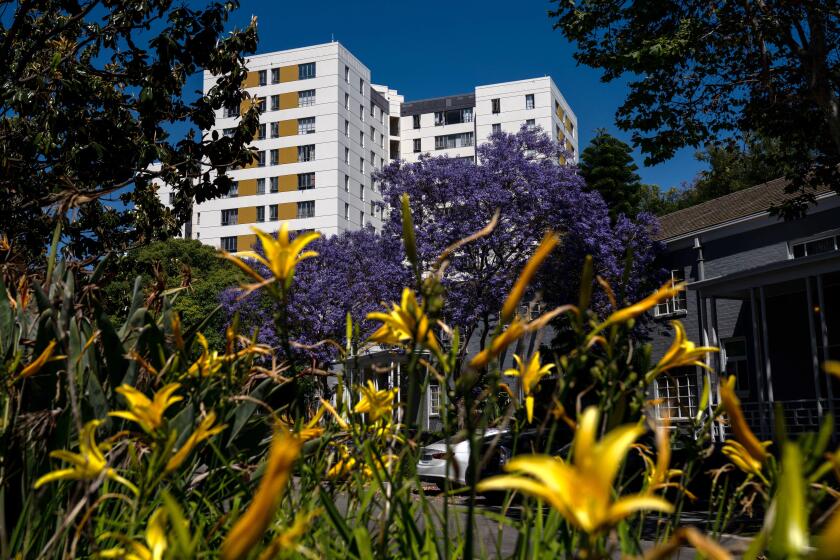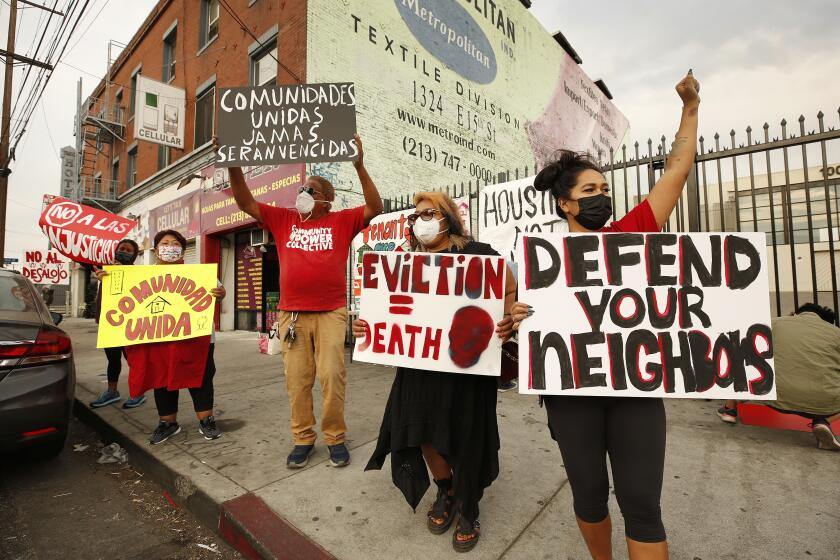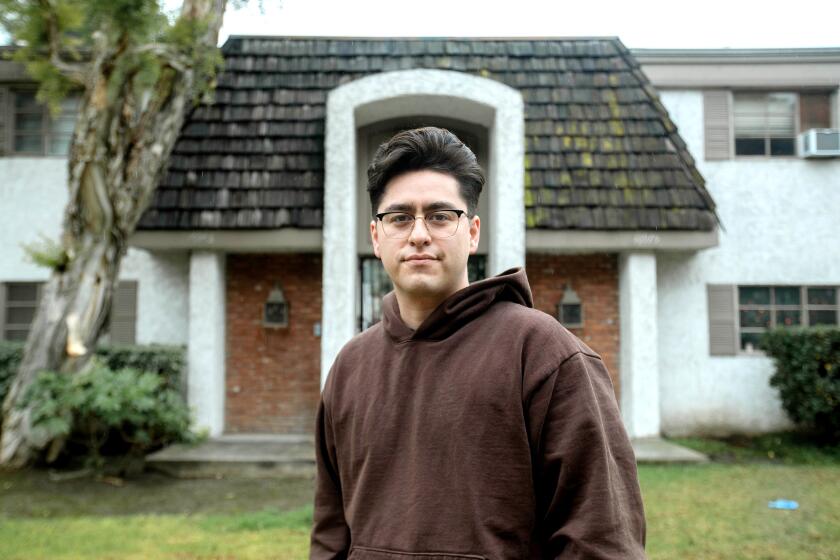California rents could skyrocket 10%. Blame inflation

- Share via
When Antioch, Calif., resident Teresa Cardenas found a notice on her door May 31 informing her that starting Aug. 1 her rent would go up from $1,181 to $1,542 a month — a more than 30% increase — she was shocked and panicked.
Cardenas, who has lived in the Casa Blanca Apartments with her husband and three children for 11 years, had just seen her rent go up $75 in November. She said she and her family have been living under the stress of possibly being evicted.
“Sometimes as it is, we don’t have enough to pay the rent, and we get behind on our other bills,” she said in Spanish. “We wouldn’t have been able to pay the rent with the increase. It’s really hard when it’s your kids asking you, ‘Mommy, are they going to evict us? Are we going to be out on the street?’ It affected me a lot.”
Some California landlords can now bump up rent demands by as much as 10%, the maximum annual increase under a law passed three years ago. But the cap doesn’t apply to all buildings — including certain types of affordable housing such as the complex Cardenas lives in.
The tenant protection and rent control law — enacted in 2019 — allows landlords to raise rents by 5% annually, plus the rate of inflation in their metropolitan area, with a maximum of a 10% hike. In previous years, the total increase has hovered between 5.7% and 9%.
But the 10% limit applies only to complexes built before 2007 and those not subjected to rent-control restrictions, meaning that landlords of buildings that fall outside those parameters can raise their rents even higher. And because inflation is so high across the board right now, every region in the state meets the requirement for the cap to be set at a 10% increase.
It also doesn’t apply to specific affordable housing units “restricted by deed, regulatory restriction contained in an agreement with a government agency or other recorded document” for low-to-moderate income families and tenants.
Along with her Casa Blanca neighbors, Cardenas sought help from the East County Regional Group, which taught them how to go to City Hall and appeal their cases to Antioch’s mayor. Last week, the latest rent hike at the apartment complex was halted, thanks to a 2020 law requiring landlords to provide at least 90 days’ notice when increasing rent on month-to-month tenants by more than 10%.
“I want to turn this bitter experience into something good, and I’ve seen that when we unite and come together, our voice matters,” Cardenas said. “I want to keep fighting. We all have a right to have dignified and healthy housing.”
Most renters in L.A. are protected from rent increases at least until May 2023. Here’s how to figure out if you qualify.
In Los Angeles, units built before October 1978 are forbidden from increasing rents until a year after the COVID-19 emergency period is over. The city banned evictions for nonpayment of rent for tenants who have endured financial hardships because of the pandemic, including lost jobs and higher medical bills and child-care costs.
But many parts of the rest of the state have no such protections.
In January 2022, Antioch resident Rocheall Pierre’s rent for her two-bedroom apartment went up $300 — to $1,800 a month. Pierre had been priced out of her apartments in San Francisco and Oakland and was homeless for a time in 2016 before finding a place in Antioch for herself and her children. Like Cardenas, Pierre lives in a building that isn’t subject to the rent increase cap.
“We don’t have control over that. We have to pay, or we’ll be evicted,” she said Monday, the first day the increases were allowed. “I’ve been homeless, and I’ve been displaced. I feel unstable because I know landlords can raise the rent at any time.”
Shanti Singh, a spokesperson for statewide renter advocacy group Tenants Together, said her organization’s hotline had an influx of calls ahead of the rent surge.
Singh said she fears that renters are going to be priced out by landlords who know they can’t afford the increase.
“There are landlords hiking the rent, knowing the tenants can’t afford it and using it as an excuse to get them out,” she said, adding that the economic recovery has been “uneven” during the pandemic, especially along racial and class lines and that a rent hike will affect those already facing financial strain.
“It’s the same inequality that existed before the pandemic, so it’s not surprising at all that these communities have taken on a disproportionate amount of debt,” she said. “It’s the most vulnerable people being left behind.”
Evictions and rent increases still are limited in Los Angeles and many other parts of Southern California. But the rules vary from city to city.
Manhattan Beach resident Taylor Avakian, who owns multiple properties in Los Angeles and North Carolina, said landlords should be able to raise rents to address an overall rise in costs.
“They have to make up for the difference somewhere,” he said. “If my power bill, insurance, etc., keep going up and I can’t raise the rent, then [landlords] are not incentivized to keep the buildings in good working condition. Why would they put in new water heaters if they can’t increase the amount of money or replace the amount of money they’re spending on expenses?”
A 10% rent hike would make up for an increase in expenses in most cases, Avakian said, but not in Los Angeles, because the city extended the eviction moratorium for qualifying tenants through the end of the year.
“I have older buildings built before 1979 that are city rent-controlled, so I can’t raise the rent at all until the eviction moratorium is over — and it’s a year after that when you can raise the rent,” he said.
But Singh pushed back on the notion that landlords are raising rents because of an increase in expenses.
“It’s not necessarily about getting hit by inflation,” she said. “Everybody is getting hit with inflation, but that doesn’t mean everybody is getting hit at the same level in terms of vulnerability.”
Avakian said he sympathizes with those who were hard hit by pandemic-related economic and health woes.
“I do understand where tenants are coming from because sometimes it can feel like all [landlords] want from a tenant is their money,” Avakian said. “[But] there are a lot of landlords who genuinely care about who lives in their properties and they could charge more than they do but don’t because those are their morals.”
As part of its COVID-19 rules, the city of Los Angeles is prohibiting rent increases for tenants in rent-controlled buildings. Elsewhere rents have gone up by double digits in recent months.
Dan Yukelson, head of the Apartment Assn. of Greater Los Angeles, said the majority of his organization is composed of small business, “mom-and-pop” owners who are dependent on the income from their properties for retirement, living expenses and medical costs.
“These are upwardly mobile immigrants who have saved and saved and sacrificed to buy these properties, and they’re being punished by COVID protections and they’re getting out of the business,” Yukelson said. “Larger companies are going to be the only ones who can buy these buildings, and we lose small-business owners who provide affordable housing.”
He noted that not all landlords are charging their tenants the maximum allowable increase.
“In a lot of cases, the last thing people want to do is force a 10% increase on a tenant who can’t afford that and have it be a situation where they have to evict them,” he said.
In Pasadena, which lifted its eviction ban June 30 and doesn’t have rent-control rules, Pasadena Tenants Union organizer Ryan Bell said his organization has been fielding calls from renters who’ve been given increase notices starting this month.
“They have to give 60 days’ notice for [a] rent increase, and they were ready for it a month or two ago so it would go into effect immediately in August,” he said. “Pasadena evictions protections for COVID were removed by [the] City Council, and so there have been a lot of no-fault evictions as well.”
Rent-control advocates have campaigned for a ballot measure that would limit increases by 75% of the annual increase in the consumer price index, Bell said. City voters will decide in November.
“If the average apartment is $2,000 a month, then 10% would be $200 a month, which is like going out and leasing out a Honda Civic without any warning,” Bell said. “People don’t do that without planning and making sure they can afford it.”
“More people are falling into homelessness faster than we can help them find their way back into housing,” he said. “It’s like we’re taking on water faster than we can bail them out, and it’s because of the rising cost of rent.”
More to Read
Sign up for Essential California
The most important California stories and recommendations in your inbox every morning.
You may occasionally receive promotional content from the Los Angeles Times.














